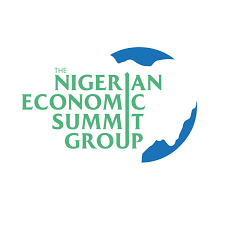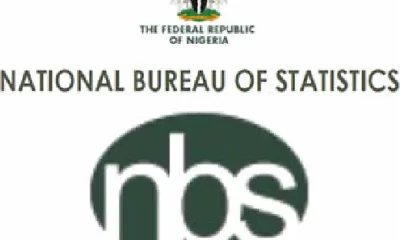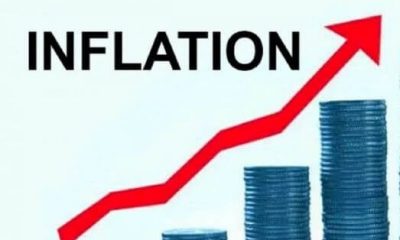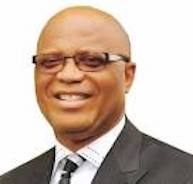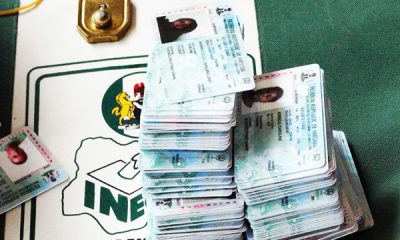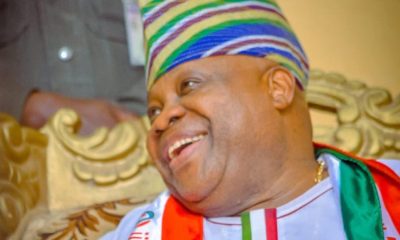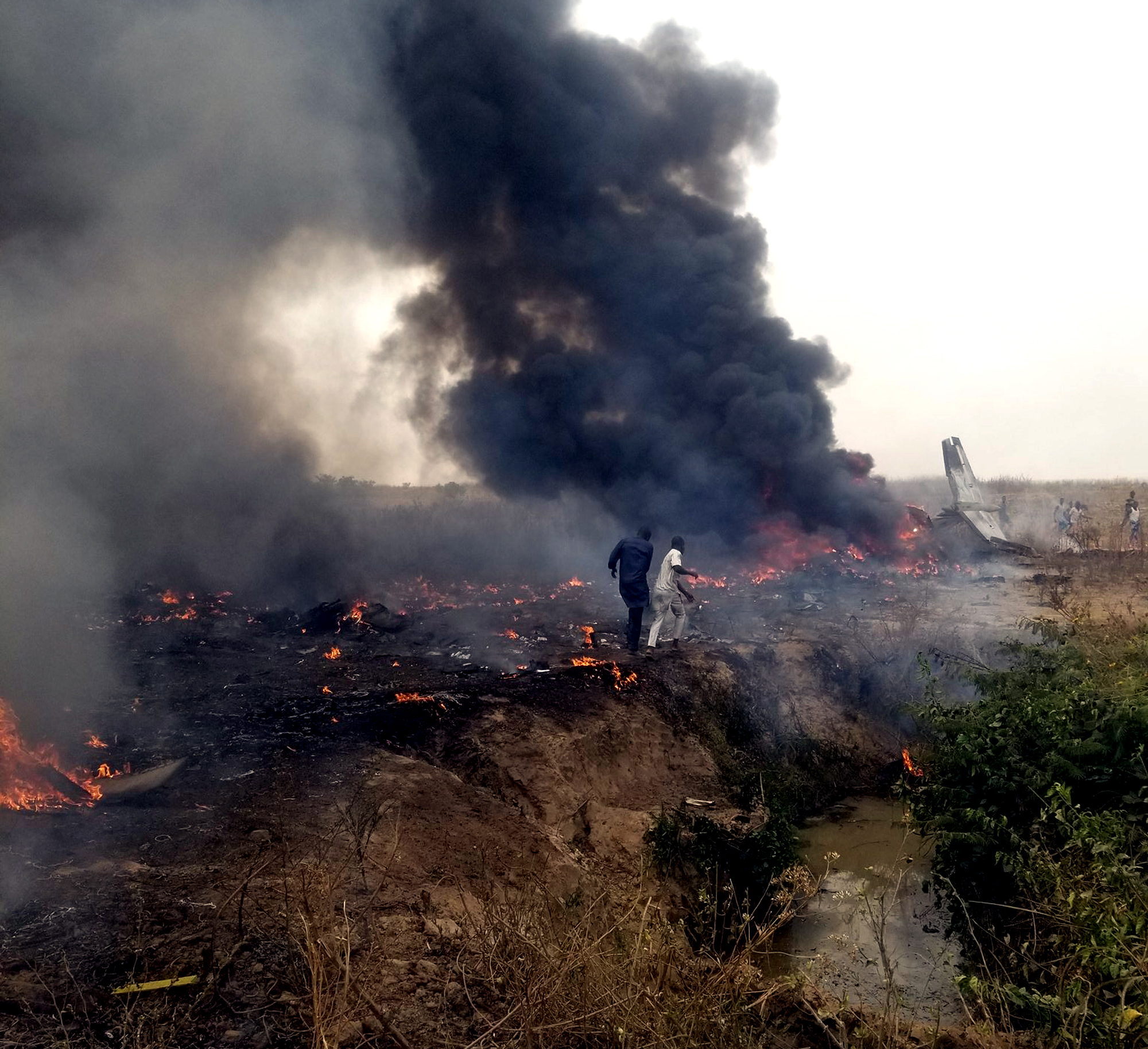Economy
Total Trade in Goods Increase to N12.02 Trn in Q2 -NBS
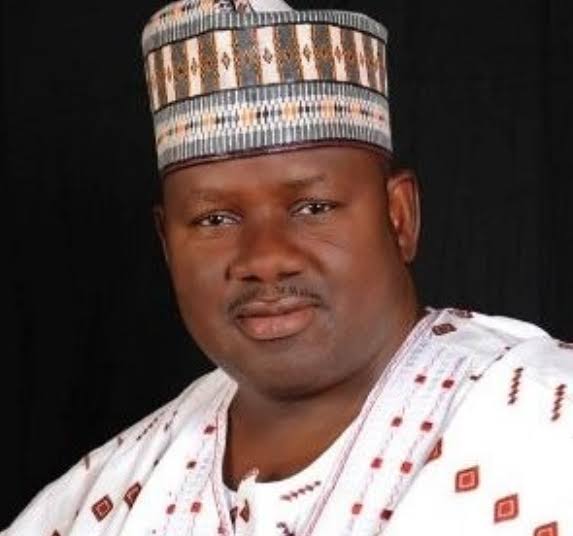
Total merchandise trade increased by 23.28 per cent in Quarter Two (Q2, 2021) to N12.02 trillion from N9.75 trillion recorded in Q1, the National Bureau of Statistics (NBS) says.
The NBS said this on Sunday in Abuja in its “Foreign Trade in Goods Statistics, Q2, 2021”, adding that the increase was a result of the sharp increase in export value during the quarter under review.
According to the report, the export component of the trade was valued at N5.
07 trillion or 42.22 per cent, while import was valued at N6.95 trillion or 57.78 per cent with trade balance deficit of N1.87 trillion.It said that crude oil, which was the major component of export trade, stood at N4.
07 trillion or 80.29 per cent of total export.“This further shows a sharp increase of 111.32 per cent in crude oil value in Q2 compared to N1.92 trillion recorded in Q1, while the non-crude oil export recorded N1 trillion or 19.71 per cent of total export trade in Q2.”
In its products classification by sectors, the NBS said that total value of trade in agricultural goods in Q2 stood at N817.35 billion, with the export component totaling N165.27 billion while the import was valued at N652.08 billion.
It added that top most of these exported agricultural products were good fermented Nigerian Cocoa beans exported mainly to Netherlands (N16.48 billion), Malaysia (N9.32 billion) and the United States of America (N8.41 billion).
The NBS said that the total value of trade in solid mineral goods in Q2, stood at N63.68 billion, with the export component of at N14.93 billion while import was valued at N48.75 billion.
According to it, the leading exported mineral products were cement exported to Niger Republic and Togo in values worth N3.12 billion and N2.32billion.
For the manufactured goods sector, the value of trade stood at N4.51 trillion representing 37.50 per cent of total trade.
It said that out of the figure, the export component accounted for N211.67 billion while the import component was valued at N4.29 trillion.
“The products that drove up manufactured products were vessels and other floating structures for breaking up, which was exported to Cameroon in the value worth N71.90 billion.
“Vessels and other floating structures for breaking up were also exported to Spain and Equatorial Guinea in values worth N18.34 billion and N6.26 billion.
“In terms of manufactured imports, used vehicles were mainly imported from United States and Italy in values worth N33.78 billion and N5.74 billion.”
In the raw materials goods sector, total trade stood at N904.51 billion with the import component valued at N840.50 billion while the export component stood at N64.01 billion.
The report said that import trade classified by region showed Asia as the leading partner with a record of N3.46 trillion or 49.92 per cent with Europe with N2.30 trillion or 33.16 per cent closely following.
Others are America with N869.1 billion, Africa N248.8 billion and Oceania N58.1 billion.
It added that out of the value recorded for Africa, import from ECOWAS countries accounted for N24.2 billion.
It said that in its analysis of imports by country of origin, data showed that the majority of the goods imported during the quarter originated from China with value of N2.078 trillion, followed by India with N570.01 billion, Netherlands N557.16 billion, United States N526.92 billion.
The NBS said that export by section revealed that mineral products accounted for N4.63 trillion or 91.29 per cent of total export trade.
“This was followed by vehicles, aircraft and parts, vessels at N141.73 billion, vegetable products N92.80 billion among others.
“In terms of regional trade, Nigeria exported most products to Asia (N1.84 trillion), Europe (N1.82 trillion), America (N806.81 billion) and Africa (N584.11 billion) while Oceania totaled N23.28 billion with goods worth N363.3 billion exported to ECOWAS.
“Analysis by country export trade showed that most goods were exported to India (N949.05 billion or), Spain (N524.49 billion), Canada (N355.60 billion) and Netherlands (N298.29 billion) and United States N256.63 billion.” (NAN)
Economy
Tinubu’s Democracy Speech Reflects Ambitious Vision – LCCI

The Lagos Chamber of Commerce and Industry (LCCI) says President Bola Tinubu’s Democracy Day speech reflects an ambitious and optimistic vision for Nigeria.
In a statement in Lagos on Thursday, the Director-General of LCCI, Dr Chinyere Almona, said the speech showed government’s appreciation of democracy, economic development, security and social cohesion.
Almona said that the President’s focus on economic growth, improving security, and increasing funding for education, healthcare, and infrastructure promised improved economic performance in the near future.
“We join all Nigerians to celebrate the peaceful transition and commitment to democratic values in the past 26 years.
“A stable political environment is very crucial for business success and for attracting investments.
“Government must stay committed to executing all its proposed programmes and ongoing reforms to ensure Nigerians reap the benefits of democracy without further delay,” she said.
The director-general also urged the government to ensure clear and consistent communication about economic reforms and policies to businesses and the general public.
This, she stated, would reduce uncertainty, build confidence and establish transparent mechanisms for tracking and reporting progress made through reforms.
Almona also called for targeted support for businesses to reduce their cost burdens relating to energy, logistics and regulatory compliance.
She said that LCCI recommended non-cash interventions that could ease the harsh production environment.
Almona also advocated expansion of social safety net programmes to support households affected by high living costs and inflation.
She also called for a more collaborative environment among government, businesses, the civil society and labour unions to ensure fair and timely negotiations on wages and working conditions.
She said that the government must implement programmes that would support strategic sectors pivotal to job creation, tax revenues and infrastructure development.
According to her, the oil and gas, power, and agriculture sectors require special attention as they offer catalytic support to the economy.
“As Nigeria reflects on the progress made and the path ahead, we urge government to remain steadfast about implementing all the required reforms toward a more sustainable and resilient economy.
“We call on government to work toward a nation built on the rule of law, justice and social cohesion even in our diversity and political sophistication,” she said. (NAN)
Economy
World Bank Cuts Global Growth Forecast to 2.3% for 2025

Global economic growth is projected to slow to 2.3 per cent in 2025 due to mounting trade tensions and persistent policy uncertainty, according to the World Bank’s latest Global Economic Prospects report.
A statement from the bank’s Online Media Briefing Centre on Tuesday noted that the new forecast was nearly half a percentage point lower than the rate projected at the beginning of the year.
The report indicated that the slowdown would mark the weakest non-recessionary global growth since 2008.
“The turmoil has resulted in growth forecasts being cut in nearly 70 per cent of all economies, across all regions and income groups,” the report states.
In spite of the gloomy outlook, a global recession is not anticipated. However, if current projections hold, average global growth in the first seven years of the 2020s would be the slowest of any decade since the 1960s.
Indermit Gill, the World Bank Group’s Chief Economist and Senior Vice-President for Development Economics, warned of deepening stagnation in the developing world.
“Outside of Asia, the developing world is becoming a development-free zone. It has been advertising itself for more than a decade,” he said.
Gill noted that growth in developing economies had declined steadily, from 6 per cent annually in the 2000s, to 5 per cent in the 2010s, and to under 4 per cent in the 2020s.
This trend mirrored the slowdown in global trade, which fell from an average of 5 per cent in the 2000s to under 3 per cent today. Investment growth had also weakened, while debt had surged to record levels.
The report projected that growth would slow in nearly 60 per cent of developing economies in 2025, averaging 3.8 per cent before a modest rise to 3.9 per cent in 2026 and 2027.
The report added that more than a full percentage point below the average of the 2010s.
“Growth in low-income countries is expected to reach 5.3 per cent in 2025, a 0.4 percentage point downgrade from earlier forecasts.
“Tariff hikes and tight labor markets are expected to keep global inflation elevated, with a projected average of 2.9 per cent in 2025, still above pre-pandemic levels.”
The World Bank warned that slowing growth would hinder efforts by developing economies to create jobs, reduce poverty, and close the income gap with advanced economies.
“Per capita income growth in these economies is forecast at 2.9 per cent in 2025, 1.1 percentage points below the 2000–2019 average.
“Assuming developing countries (excluding China) maintain a GDP growth rate of 4 per cent the forecast for 2027, it would take them about two decades to return to their pre-pandemic growth trajectory.”
Still, the report noted that global growth could rebound more quickly if major economies reduced trade tensions.
It said that resolving current disputes and halving tariffs could boost global growth by 0.2 percentage points over 2025 and 2026.
In response to rising protectionism, the World Bank urged developing economies to diversify trade, pursue strategic partnerships, and engage in regional agreements.
Given constrained public resources and growing development needs, policymakers are encouraged to mobilise domestic revenue, prioritise spending for the most vulnerable, and enhance fiscal management.
To drive sustainable growth, the report emphasised the need to improve business environments, expand productive employment, and align workforce skills with market demands.
Finally, it highlighted the importance of global cooperation in supporting the most vulnerable economies through multilateral initiatives, concessional financing, and targeted relief for countries affected by conflict.(NAN)
Economy
Eid-el-Kabir: Ram Sellers Decry Low Patronage as Prices Soar in Ile-Ife

The Chairman, Ram Sellers’ Association, Odo-Ogbe Market, Ile-Ife, Osun, Alhaji Akeem Salahudeen, has complained of low patronage, attributing it to high cost of rams and the economy situation in the country.
Salahudeen stated this in an interview on Wednesday in Ile-Ife.
He said that the big sized ram which was sold between N550,000 and N620,000 last year are now being sold at the rate of N800,000 to N1.
2 million.He added that the medium sized ram which was sold between N300,000 and N350,000 last year is now going for between N450,000 and N550,000.
According to him, small sized ram sold for N200,000 and N230,000 last year now attracts N300,000 and N450,000 this year.
He attributed the increase in the prices of rams in this year’s Sallah to the insecurity in the North, which he claimed had disrupted the supply chain.
“They said the worsening insecurity in the North has forced some sellers to import rams from neighbouring countries like Niger, Mali and Chad, which they said contributed to the high prices,” he emphasised.
At Sabo Cattle Market in Ile-Ife, Alhaji Saheed Yaro, said that the price of rams has surged as the small sized ram which was sold at N150,000 and N180,000 last year, is now being sold between N250,000 and N350,000.
Yaro added that the price of medium sized ram which was between N185,000 and N260,000 last year now goes for between N350,000 to N450,000.
Accordingly, the big sized ram sold between N480,000 and N500,000 last year is now between N550,000 and N780,000.
At Boosa Cattle Market located at Modakeke, Mr Musa Salami stated that prices of rams have witnessed sharp increase with a medium sized ram which was for N170,000 to N200,000 last year is now at N250,000 to N300,000.
Salami stated further that the big sized ram that was sold at N350,000 and N400,000 is now being sold at N600,000 to N750,000.
He added that he brought 150 rams a week ago, but has been able to sell only 15, explaining that many customers turned back on hearing prices without buying.
He noted that customers who usually bought rams from him over the years are now complaining about costs.
NAN reports that ram sellers expressed concern over low patronage in many markets, saying that customers were lamenting the high cost of the animals.
A civil servant, Mr Bayo Olabisi, said that most workers in the state cannot afford to buy rams for this year’s Eid-el-Kabir due to the high prices and the economic hardship.
Olabisi added that the present economic hardship has been taken a toll on the workers, especially with the high transportation and other costs following the removal of fuel subsidy by the government.
“In fact, I visited three places where they sell rams, but I couldn’t buy any because I can’t afford to buy.
“When I priced a medium sized ram, the seller told me N250,000, the same size of ram I bought for N150,000 last year.
“I would rather use part of my salary to buy half bag of rice and two chickens for my family.
“For Allah has said that if you can’t afford ram, you should not borrow or buy on credit because there’s no reward on that,“ he said. (NAN)

